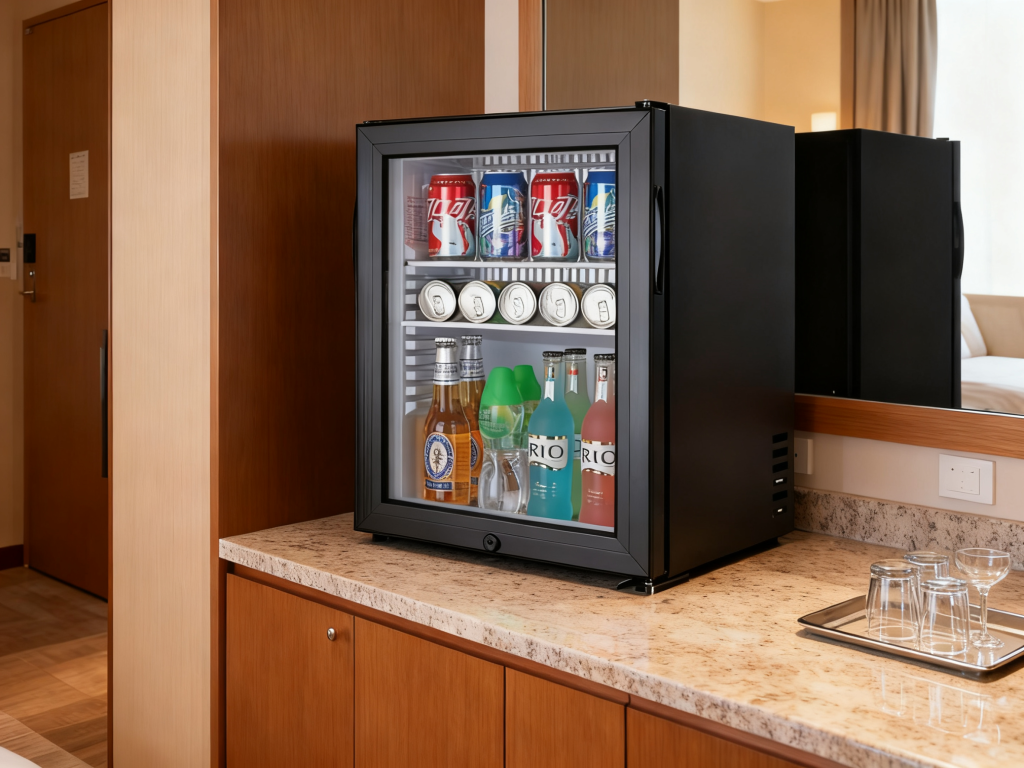When selecting a glass door mini bar fridge for hotel rooms, offices, or luxury suites, understanding the key features makes all the difference. A well-chosen unit not only enhances the guest experience but also supports energy efficiency, operational reliability, and interior aesthetics. The right fridge should balance visual appeal with performance, keeping beverages and snacks perfectly chilled while complementing the room design.
The most distinctive feature of a glass door mini bar fridge is, of course, its transparent door. High-quality tempered glass allows guests to see the contents without opening the door, reducing unnecessary temperature loss and energy consumption. This clear visibility enhances convenience for users, as they can easily check available drinks or snacks at a glance.
When evaluating glass door quality, choose models that use tempered or Low-E insulation glass for better durability and energy retention. The door should also fit the room’s overall décor—modern, minimalist, or luxury well. In hotel environments, a sleek glass door can increase the sense of sophistication and add to the overall guestroom atmosphere.
Noise control is essential in hospitality settings. Guests expect a peaceful environment, and a noisy fridge can quickly disrupt that experience. Modern glass door mini bar fridges are designed with low-noise compressors or absorption cooling systems that operate quietly, ensuring comfort without sacrificing cooling performance.
When selecting a unit, check for quiet operation ratings and vibration-free performance. Quality fridges often feature sound-dampening technology, insulated cabinets, and advanced compressor systems to minimize operational noise. A near-silent minibar can enhance guest satisfaction and improve room ratings.
Energy consumption directly affects both hotel operating costs and environmental impact. Energy-efficient mini bar fridges are equipped with advanced refrigeration systems that maintain optimal cooling with minimal power use. Look for units featuring eco-friendly refrigerants, thick insulation, and intelligent temperature control systems.
An energy-saving glass door fridge not only helps reduce electricity bills but also supports sustainable development goals. Choosing a unit with green credentials demonstrates a hotel’s commitment to environmental responsibility—an increasingly important factor for modern travelers.
Every hospitality space has different requirements. Some rooms need a compact 17-liter unit, while executive suites might require larger models of 30 or 60 liters. A good manufacturer provides multiple capacity options to match different room sizes and usage scenarios.
When choosing the right fridge, consider available space, storage needs, and installation type. Built-in fridges blend perfectly with cabinetry, while freestanding models are ideal for flexible room layouts. Adjustable shelves, LED lighting, and ergonomic door designs make these fridges not only practical but also visually appealing additions to any guestroom.

Hotel equipment must endure frequent use, and a mini bar fridge is no exception. Durability depends on high-quality materials, strong hinges, and well-sealed doors. A good glass door fridge uses corrosion-resistant metal housing, sturdy interior fittings, and thick gaskets that prevent air leaks.
Tempered glass doors are essential for safety and longevity, offering resistance against impact and scratches. Reliable manufacturers also implement strict quality-control processes and multi-stage testing to ensure long-term performance. Investing in a durable unit reduces maintenance costs and enhances reliability over the years of service.
Beyond performance, the visual design of a glass door mini bar fridge plays a major role in hotel room aesthetics. A sleek exterior finish, subtle lighting, and minimalist door frame create a modern and elegant impression. LED interior lighting can further enhance the presentation of beverages and snacks, adding a premium feel.
Many brands now offer customizable finishes, color options, and branding possibilities, allowing hotels to align their minibars’ look with their interior design concept. Whether placed under the counter or within custom cabinetry, a well-designed glass door fridge becomes part of the room’s overall visual harmony.
The cooling system is the heart of any mini bar fridge. A reliable glass door model maintains consistent internal temperatures, ensuring drinks remain chilled even with frequent door openings. High-end models use compressor or absorption refrigeration systems known for steady performance and long-term reliability.
Insulated double- or triple-layer glass doors help maintain internal temperatures by minimizing heat exchange. Some units also include automatic defrost functions, digital temperature controls, and optimized air circulation for uniform cooling. Effective insulation ensures that energy is used efficiently, improving both performance and sustainability.
Ease of maintenance is a critical yet often overlooked aspect. A well-designed glass door mini bar fridge should be easy to clean, service, and maintain. Removable shelves, spill-resistant surfaces, and easily accessible components make regular cleaning faster and more efficient.
When purchasing, consider the availability of spare parts, after-sales support, and warranty coverage. Models with simple access panels and self-diagnostic systems are particularly convenient for hotel staff, reducing downtime and ensuring consistent operation.
Choosing the right glass door mini bar fridge involves more than the appearance. Factors such as transparent door quality, quiet operation, energy efficiency, durability, capacity, thermal performance, and ease of maintenance all play key roles in delivering the best guest experience.
A thoughtfully selected mini bar fridge not only enhances convenience and comfort but also contributes to the room’s style and the property’s operational efficiency. For hotels, resorts, or luxury residences, investing in a high-quality glass door mini bar fridge is a smart choice that combines practicality, performance, and visual appeal—creating a lasting impression on every guest who opens its door.
Recent postsLearn More